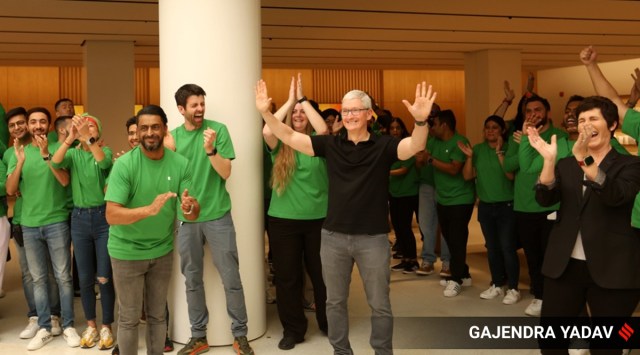Apple in India: Why Tim Cook enjoys Shah Rukh Khan and Sachin Tendulkar-level fame in India
Apple in India: Why Tim Cook enjoys Shah Rukh Khan and Sachin Tendulkar-level fame in India
For an obscene amount of money, you can buy a sense of individuality, mass produced

For the pure rationalist, there is little difference between a cult and a religion. Both rely on an unreasonable deification of and identification with symbols, practices, beliefs and rituals that can mean anything and everything to a believer. But then, there is at least a hint of the unknown and the sublime, or even the small comforts of community and believing that there’s more to existence and consciousness than just a crass materialism in religious traditions. That is not the case with the most annoying and pointless of cults – brand loyalty. And nowhere is this more visible than with the Apple obsessive yuppies that seem to be growing in number.
The opening of two Apple stores, inaugurated by Tim Cook, in Delhi and Mumbai, saw devotees thronging to pay homage at malls. The photographs of a mass of people waiting to see a shop open in Delhi’s Select Citywalk mall, for instance, had an eerie similarity to the crowds at Siddhivinayak temple during Ganesh Chaturthi or the crowds at CR Park during Durga Pooja. The reverence for Tim Cook — who is, in the final analysis, just a corporate officer — is of the sort usually reserved for Sachin Tendulkar-level cricketers or Shah Rukh Khan. Why?
It cannot be because of the products that Apple produces. There is no doubt that an iPhone or a Macbook is a great machine, perhaps best-in-class. They certainly cost enough — the ease of use is paid for in hard cash or debilitating credit. Why revere the product of a business transaction, stand in line for hours just to do darshan at a shop?
Why is it that so many people take their relationship with a company and its products as a central part of their identity? Buy the phone, laptop, pad and be done with it, right? Two possible justifications present themselves, and both lead to depressing conclusions about the state of the world and the people in it.
The first is the genius of the Apple brand itself. The lessons modern brand-building has learnt from political iconography (deliberately and unwittingly) is a little recognised — though well-researched — phenomenon. For example, in The Swastika: Constructing the Symbol Malcolm Quinn shows how the symbol which had varied meanings throughout history was stripped of its complexity and then repurposed as a tool for a regressive, hateful ideology. Apple, of course, is hardly as bad. Yet, the sleek design, intuitive interface and just general association with all things cool has managed to hide the fact that like every other tech hardware company, it relies on exploitative labour, produces harmful waste and has obsolescence built into its products. The success of the fruit logo, the well-designed stores, and even the aspirational aspect of owning something so fragile and expensive, seems to have blinded the Apple fanatic to a stark reality: The company is about one thing — profits.
The second reason for the Apple fanatic elevating a phone company to a church is even more depressing. Even now, the vast majority of Indians cannot afford an Apple product. But between those who can afford their entire line — phone, laptop, iPad, Apple TV, the watch — there is a beautifully exclusive, self-contained universe. Now, when religion is about politics and so, disillusionment, and spirituality too is hijacked by godmen and self-help books, devotion to a computer manufacturer has become a form of identity. “I’m an Apple guy,” is uttered without a sense of irony. For an obscene amount of money, you can buy a sense of individuality, mass produced.
- Get link
- X
- Other Apps